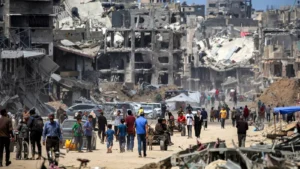Hamas said to express ‘flexibility’ over post-war Gaza future

Palestinians move past destroyed buildings along a street in Khan Younis in the southern Gaza Strip on 14 May 2024
David Hearst in Doha reports in Middle East Eye on 29 May 2024:
Hamas is prepared to show “flexibility” about the future governance of Gaza, as long as the decision to rule the war-battered enclave is agreed upon by other Palestinian factions and is not imposed by either the United States or Israel, a senior Palestinian source with knowledge of Hamas’ policies has told Middle East Eye.
The source, speaking on condition of anonymity due to the sensitive nature of the topic, also said that Hamas felt the balance of power was “tilting” in its favour as Israel grapples with mounting political divisions over the future of post-war Gaza.
“Hamas is confident that it is deeply rooted in the region and nobody can bypass it,” the source told MEE. “Nevertheless, Hamas has the political flexibility to accept several formulas… for the future of Gaza. [It is] open to a nationally agreed formula for the good of its people. “[But] any settlement that has a chance of being agreed upon nationally should not be imposed by America or Israel. They can not bargain with a weak Palestinian state,” the source added.
Talks on a ceasefire were due to resume this week, but Hamas told international mediators on Tuesday that it was ending its participation following Sunday’s “massacre” in Rafah by Israel. At least 45 people were killed and dozens more wounded, most of them women and children, when Israel struck a camp housing displaced Palestinians in the Tel al-Sultan neighbourhood of western Rafah. The air strikes, which resulted in some Palestinians being burned alive, came just two days after the International Court of Justice (ICJ) ordered Israel to “immediately halt its military offensive in Rafah”.
“Hamas does not have to sit down for negotiations while the Israelis continue killing,” a second source close to the organisation told MEE. “Continuing negotiations while massacres [still happen] provide cover for the massacres and even led to the killing of an Egyptian soldier. This will not happen again.”
The source said that Hamas would only resume negotiations if Israel stopped the massacres and left Rafah. The Rafah crossing must return to its previous administration, he added, referring to the pre-7 October arrangement.
Negotiations at an impasse
Speaking on Saturday before the strikes on the refugee camps, the first source said negotiations had been effectively deadlocked, after the failure of the last round in Cairo and Doha. He said that negotiations following Israel’s assault on Rafah were now “at an impasse” and the US needed to address issues with Israel over a permanent ceasefire.
